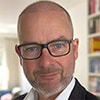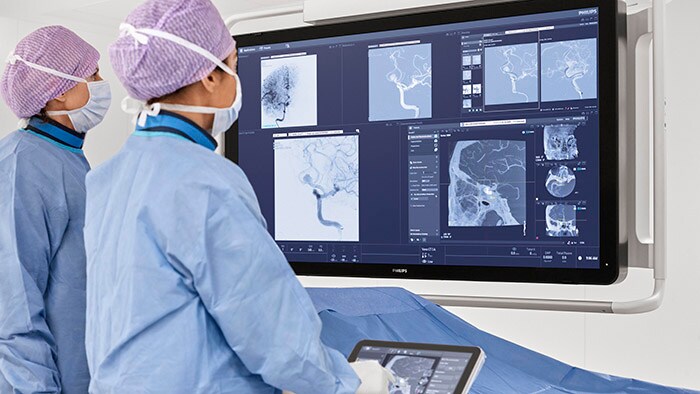Jun 14, 2023
Philips' direct-to-angio stroke pathway: new analysis demonstrates substantial cost savings in addition to improved patient outcomes
Economic analysis of cost of Vall d’Hebron University Hospital Stroke Unit shows direct-to-angio stroke pathway can save more than USD 3,000 per patient
Amsterdam, the Netherlands – Royal Philips (NYSE: PHG, AEX: PHIA), a global leader in health technology, today announced the results of a health economic analysis published in the Journal of NeuroInterventional Surgery (JNIS) that show an innovative approach to the stroke care pathway reduced costs by an average of EUR 2,848 (~USD 3,120) per patient. The retrospective analysis looked at data from the controlled single-center ANGIOCAT clinical trial conducted at the Vall d’Hebron University Hospital Stroke Unit (Barcelona, Spain) [1]. Earlier results from this study demonstrated that a ‘Direct-to-Angio Suite’ (DTAS) pathway improves clinical outcomes for patients who have suffered a stroke.
The ANGIOCAT clinical study has already shown that bringing stroke patients directly to the angio suite improves patient outcomes. The economic analysis of the data now tells us we can also significantly reduce costs.
Dr. Manuel Requena
Stroke and Interventional Neurologist, University Hospital Vall d’Hebron
“The ANGIOCAT clinical study has already shown that bringing stroke patients directly to the angio suite improves patient outcomes. The economic analysis of the data now tells us we can also significantly reduce costs,” said Dr. Manuel Requena, Stroke and Interventional Neurologist, University Hospital Vall d’Hebron. “This indicates that the initial up-front investment of a direct-to-angio suite workflow will result in a fast return on investment for healthcare providers.”
Innovating the stroke pathway
After initial triage in the emergency department, the typical treatment pathway for stroke involves sending the patient to the radiology department for a diagnostic CT or MRI brain scan. This adds time, often worsened by gaps in communication, information, and access to stroke expertise. For stroke centers, a time-saving alternative is to have a dedicated angio-suite permanently on standby, to which stroke patients can be transferred immediately after admission. Using cone-beam CT imaging, such as that built into Philips Image Guided Therapy System – Azurion, clinicians can make a diagnosis and intervene on-the-spot, saving precious time. The health economics analysis indicates that a positive return on investing in a dedicated angio suite can be achieved in only a few years.
Philips cone-beam CT
Philips’ DTAS workflow is enabled by an advanced cone-beam computed tomography (CBCT) brain scan performed directly in the angio suite to diagnose patients. CBCT utilizes a cone-shaped beam of X-rays and a flat-panel detector mounted on a C-arm gantry similar to that routinely used in an angio suite, capturing multiple images from different angles to reconstruct 3D images of the brain. Thanks to technology breakthroughs, Philips has increased the diagnostic confidence of CBCT from 32% to 93% in the space of a few years [3][4][5]. This technology can rule out intracranial hemorrhages and identify large vessel occlusions (LVOs), which account for roughly a quarter to a half of acute ischemic strokes [2]. Patients diagnosed with an LVO can then be immediately operated on using a minimally invasive image-guided procedure known as a mechanical thrombectomy to open up the blocked artery causing their stroke.
Lower cost, better patient outcomes
Multiple single-center studies have shown the positive impact of DTAS on clinical outcomes with the result that many dedicated stroke centers have already adopted it. A large multi-center randomized clinical trial called WE-TRUST (Workflow Optimization to Reduce Time to Endovascular Reperfusion for Ultra-fast Stroke Treatment) [8] is currently running to confirm the patient benefit of DTAS.
Philips’ stroke portfolio includes solutions for stroke monitoring and communication in ambulances, tele-stroke patient assessment, diagnostic imaging and analysis, image-guided therapy, neurological monitoring and assessment, and more. Its image-guided stroke therapy solutions are based on the Philips Image Guided Therapy System – Azurion.
[1] Requena M, Vanden Bavière H, Verma S, et al. Cost-utility of direct transfer to angiography suite (DTAS) bypassing conventional imaging for patients with acute ischemic stroke in Spain: results from the ANGIOCAT trial.
Journal of NeuroInterventional Surgery Published Online First: 27 April 2023. doi: 10.1136/jnis-2023-020275
[2] World Stroke Organization (WSO): Global Stroke Fact Sheet 2022 (https://www.world-stroke.org/assets/downloads/WSO_Global_Stroke_Fact_Sheet.pdf)
[3] Nicholson P, Cancelliere NM, Bracken J, et al. Novel flat-panel cone-beam CT compared to multi-detector CT for assessment of acute ischemic stroke: A prospective study. Eur J Radiol. 2021 May;138:109645. doi: 10.1016/j.ejrad.2021.109645. Epub 2021 Mar 10. PMID: 33725654.
[4] Cancelliere NM, Hummel E, van Nijnatten F, et al. The butterfly effect: improving brain cone-beam CT image artifacts for stroke assessment using a novel dual-axis trajectory. J Neurointerv Surg. 2023 Mar;15(3):283-287. doi: 10.1136/neurintsurg-2021-018553. Epub 2022 Apr 27. PMID: 35478176; PMCID: PMC9985729.
[5] Cancelliere NM, van Nijnatten F, Hummel E, et al. Motion artifact correction for cone beam CT stroke imaging: a prospective series. J Neurointerv Surg. 2022 Dec 23:neurintsurg-2021-018201. doi: 10.1136/jnis-2021-018201. Epub ahead of print. PMID: 36564201.
[6] WE-TRUST. Workflow optimization to reduce time to endovascular reperfusion for ultra-fast stroke treatment, ClinicalTrials. gov, U.S. National Library of Medicine, identifier: NCT04701684. n.d. Available: https://clinicaltrials.gov/ct2/show/ NCT04701684. The WE-TRUST study is sponsored by Philips.
About Royal Philips
Royal Philips (NYSE: PHG, AEX: PHIA) is a leading health technology company focused on improving people's health and well-being through meaningful innovation. Philips’ patient- and people-centric innovation leverages advanced technology and deep clinical and consumer insights to deliver personal health solutions for consumers and professional health solutions for healthcare providers and their patients in the hospital and the home. Headquartered in the Netherlands, the company is a leader in diagnostic imaging, ultrasound, image-guided therapy, monitoring and enterprise informatics, as well as in personal health. Philips generated 2022 sales of EUR 17.8 billion and employs approximately 74,000 employees with sales and services in more than 100 countries. News about Philips can be found at www.philips.com/newscenter.











